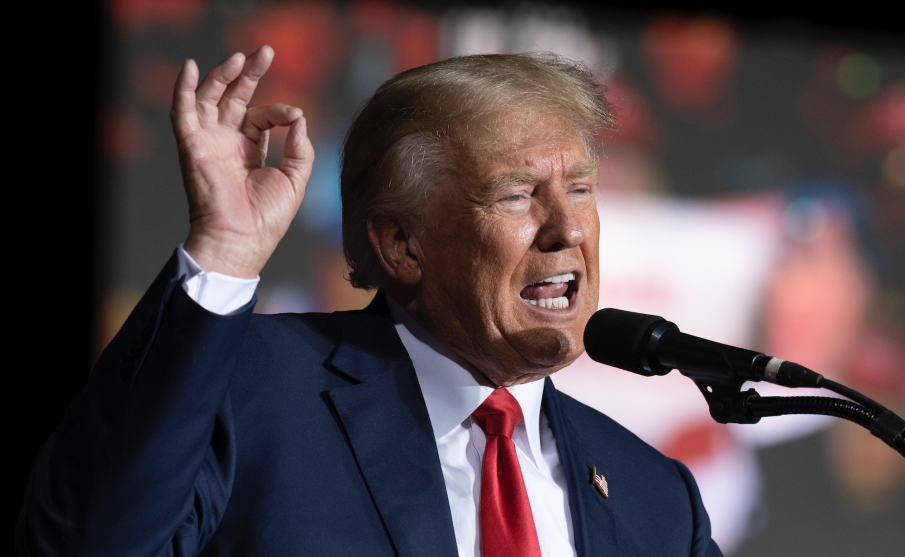
José Luis Villegas/AP
Manhattan prosecutors on Friday flatly accused Donald Trump of helping executives at his companies commit tax fraud. The allegations came during closing arguments of a trial in which the ex-president’s businesses are charged with allowing key employees to reduce their taxable salaries while simultaneously providing them with off-the-record benefits—like company cars and apartments. For much of the trial, both sides told the jury that the case wasn’t about Trump himself. But after defense attorneys continually referred to Trump in their own closing on Thursday, prosecutors took the opportunity to target him directly.
Prosecutor Joshua Steinglass showed jurors a memo in which Trump signed off on a request by chief operating officer Matthew Calamari, who had asked for his salary to be reduced by the exact amount that the company was spending on his annual rent.
“Mr. Trump explicitly sanctioning tax fraud! That’s what this document shows!” Steinglass told jurors, leading to a flurry of noisy objections from Trump’s attorneys.
New York Superior Court Judge Juan Merchan eventually sided with the defense, but it did little to blunt the prosecutor’s point, and Merchan allowed Steinglass to tell the jurors that Trump knew all about the alleged tax fraud going on at his company. Neither Calamari nor Trump has not been charged with any crime, but Trump’s longtime chief financial officer, Allen Weisselberg, pleaded guilty to scheming to reduce his own taxable income in exchange for more benefits from the company.
Steinglass’ claim follows his statements on Thursday that Trump “knew exactly what was going on with his top executives” and that the Trump Organization as a whole “cultivated a culture of fraud and deception.”
Throughout the month-long trial, defense attorneys have argued that “Weisselberg did it for Weisselberg”—that is, they sought to portray him as a powerful executive who used his position to cheat on his own taxes without the knowledge of Trump or the Trump Organization as a whole. In fact, defense attorneys argued, Weisselberg actively hid his misdeeds from Trump and his adult children—he betrayed them.
Prosecutors were initially content to paint Weisselberg—along with other employees who had helped adjust salaries—as executives of a larger business enterprise that deserved to be held responsible as an institution.
But following the defense’s closing on Thursday, which continually invoked Trump’s name, Merchan ruled that prosecutors, too, were mostly free to talk about Trump.
“This case is not about politics, it’s just two corporations helping its executives cheat on their taxes,” Steinglass said in his closing, echoing what he said during opening statements.
Trump’s attorneys were visibly irritated in court on Friday morning, and they repeatedly objected throughout Steinglass’ closing almost every time he mentioned Trump’s name.
“I’m here to remind you that Donald Trump is not on trial, and we don’t have to prove a thing about what he knew or didn’t know,” Steinglass said. “But the defense has gone to great lengths to try and disclaim Donald Trump’s involvement.”
“This whole narrative that Donald Trump was blissfully unaware is just not true,” Steinglass told jurors.
After jurors left the room, Trump attorney Michael van der Veen angrily demanded a mistrial over Steinglass’ tone during his closing, including the prosecutor’s statement that Trump had personally sanctioned the tax fraud and another instance in which Steinglass referred to Trump and his adult children as “unindicted co-conspirators,” (Steinglass quickly retracted the latter comment after a rebuke from Merchan.) Van der Veen also complained that Steinglass had referred to van der Veen’s defense strategy as “nonsense.”
Steinglass told Merchan that Trump could be called a co-conspirator because he was involved in one of the specific acts for which a crime had been charged. Merchan said he wouldn’t declare a mistrial because Steinglass had taken back the statements in front of the jury.
Jurors were dismissed for the day and on Monday will return to deliberate.








